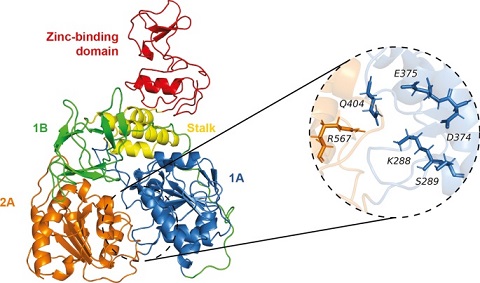Study Finds That Even SARS-CoV-2 Protein NSP13 Plays A Role In Thwarting The Body's Immune Defenses By Targeting IRF3
COVID-19 News - NSP13 - IRF3 Jun 21, 2023 1 year, 9 months, 3 weeks, 6 days, 12 hours, 54 minutes ago
The SARS-CoV-2 NSP13 Protein Has Been Understudied So Far But Its Key Role In COVID-19 Pathogenesis Is Gradually Emerging
COVID-19 News: Since its emergence in late 2019, severe acute respiratory syndrome coronavirus 2 (SARS-CoV-2), the virus responsible for the global pandemic of coronavirus disease 2019 (COVID-19), has posed an unprecedented threat to human health. One of the key challenges in combating this virus is its ability to impair the body's antiviral immune response, particularly the interferon (IFN) system.
 SARS-CoV-2 Helicase NSP13
SARS-CoV-2 Helicase NSP13
Although researchers have identified several viral proteins as potential antagonists to IFN, the underlying molecular mechanisms have remained elusive
In a groundbreaking study conducted by Guangzhou Medical University in China and the Wuhan Institute of Virology, Chinese Academy of Sciences, scientists have made significant strides in unraveling the intricate interactions between SARS-CoV-2 and the host immune system, shedding light on the virus's ability to evade immune defenses.
The role of the NSP13 protein has been understudied so far but recent research is beginning to highlight the role of the NSP13 protein on COVID-19 pathogenesis including a recent
COVID-19 News coverages that showed it causes mitochondria dysfunction.
https://www.thailandmedical.news/news/could-study-that-shows-proteins-nsp12-and-13-of-sars-cov-2-causing-mitochondrial-dysfunction-explain-for-prevalence-of-chronic-fatigue-syndrome-in-cov
The Role of NSP13 in IFN Response Inhibition
The research team's findings reveal that SARS-CoV-2 NSP13, a protein encoded by the virus, plays a pivotal role in antagonizing the IFN response. Specifically, NSP13 effectively inhibits the response induced by a constitutively active form of a transcription factor called IRF3 (IRF3/5D). Intriguingly, this inhibition occurs independently of the previously identified NSP13 target, TBK1, a key kinase involved in IFN production. This suggests that NSP13 has the ability to interfere with the IFN response at the level of IRF3 itself, contributing to the virus's ability to impede the host's antiviral defenses.
IRF3 is a member of the interferon regulatory transcription factor (IRF) family. IRF3 plays an important role in the innate immune system's response to viral infection.
Unveiling the NSP13-IRF3 Interaction
To understand the precise mechanism underlying the NSP13-mediated inhibition of IRF3, the study team delved into the interactions between these two proteins. Their experiments uncovered a specific and robust interaction between NSP13 and IRF3, which surpasses the strength of the NSP13-TBK1
interaction. Furthermore, the study identified the NSP13 1B domain and the IRF association domain (IAD) of IRF3 as the regions responsible for this interaction. These findings demonstrate the direct targeting of IRF3 by NSP13, reinforcing the notion that IRF3 is a primary target for viral immune evasion.
Impairment of IRF3 Signaling and Antiviral Defense
The consequences of the NSP13-IRF3 interaction were investigated in terms of IRF3-mediated signaling and its role in antiviral gene expression. The research team discovered that NSP13 effectively blocks IRF3-directed signal transduction, preventing the activation of genes responsible for antiviral defenses against SARS-CoV-2. By subverting IRF3-driven anti-SARS-CoV-2 activity, NSP13 contributes to the virus's ability to evade immune surveillance and promote its replication within the host.
Implications and Future Directions
This groundbreaking study not only provides crucial insights into the molecular mechanisms behind SARS-CoV-2's immune evasion strategies but also highlights the significance of IRF3 as a key target for NSP13. The findings pave the way for further investigations into the development of therapeutic interventions that specifically target the NSP13-IRF3 interaction, with the ultimate goal of bolstering the host immune response against SARS-CoV-2.
As the COVID-19 pandemic continues to pose a global health crisis, understanding the complex interactions between the virus and the host immune system is paramount for the development of effective antiviral strategies.
This study findings represents a significant milestone in our battle against SARS-CoV-2, bringing us one step closer to unraveling the virus's sophisticated tactics and ultimately defeating this formidable adversary.
The study findings were published in the peer reviewed Journal of Medical Virology.
https://onlinelibrary.wiley.com/doi/10.1002/jmv.28881
For the latest
COVID-19 News, keep on logging to Thailand Medical News.
